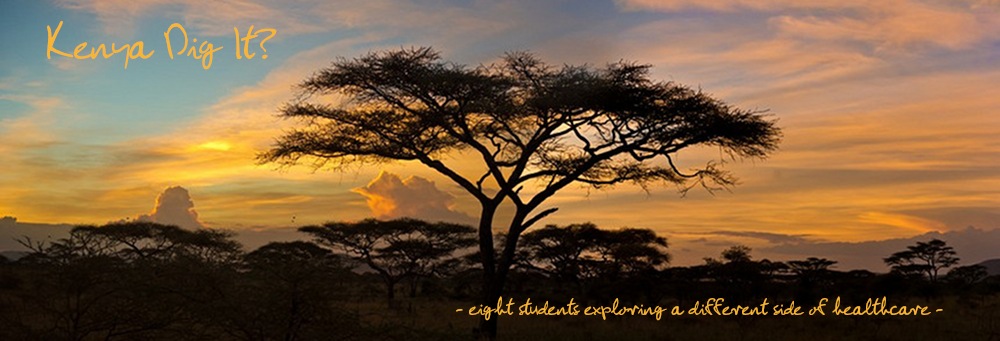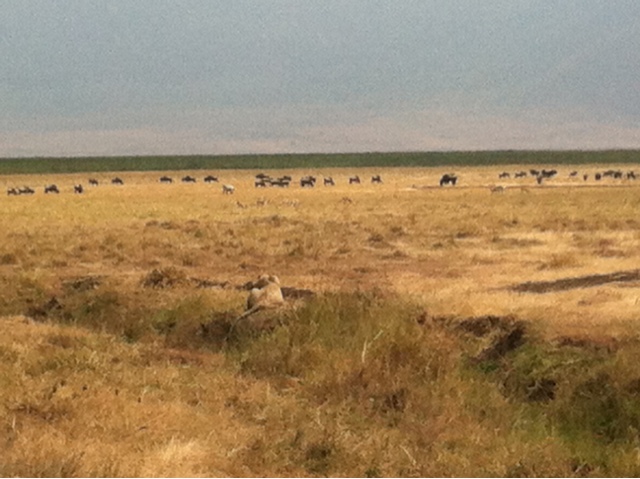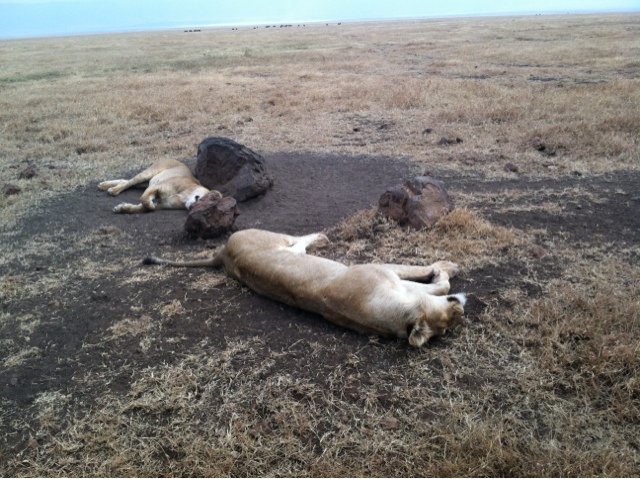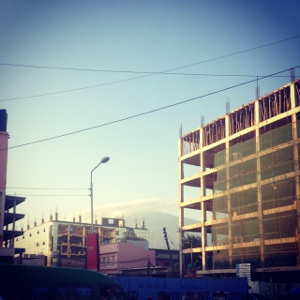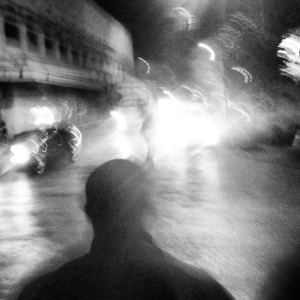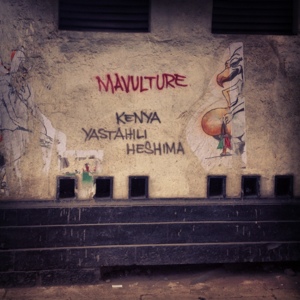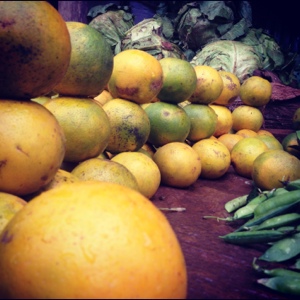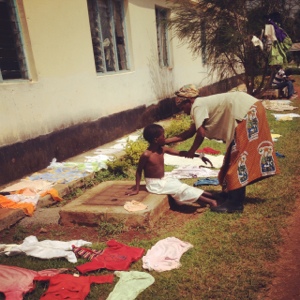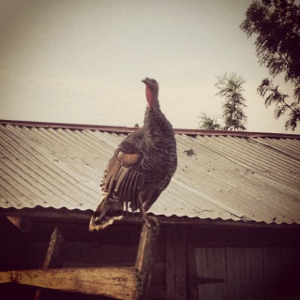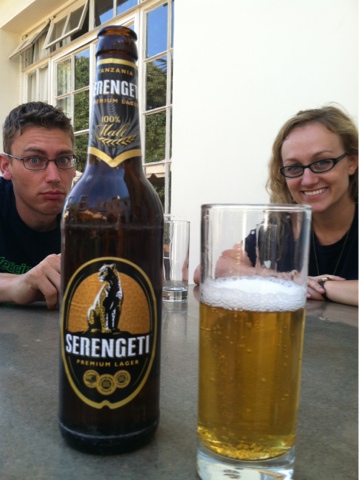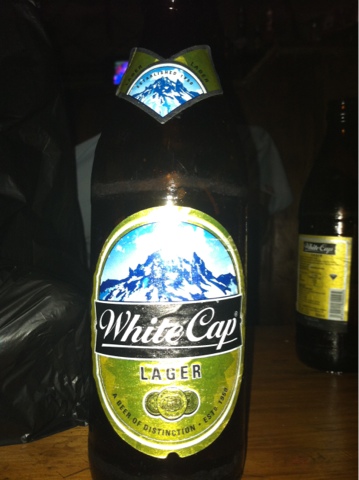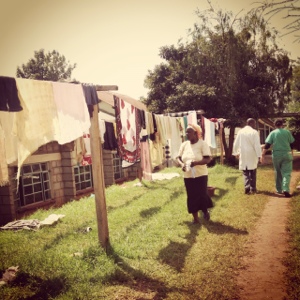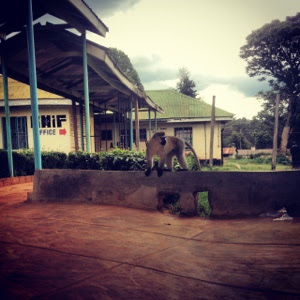Monday, September 3, 2012
Tuesday, August 21, 2012
Safari Photos Edited!
Soooo, I'm now a little behind in school...but I couldn't resist editing at least a few of my photos to show off. It's an uphill battle--I took somewhere near 4200 photos--but I'm here to say that I'll have them edited in the near future. Hope you enjoy them!
http://www.flickr.com/photos/82011407@N04/sets/72157631185872706/
Sam
http://www.flickr.com/photos/82011407@N04/sets/72157631185872706/
Sam
Wednesday, August 1, 2012
Made it back!
We arrived yesterday in NYC, without delay. Even though I got randomly screened at immigration and had to wait for two hours, it felt good to be back.
Thanks for following along. More updates are to come, so check back in the coming weeks.
Sam
Thanks for following along. More updates are to come, so check back in the coming weeks.
Sam
Monday, July 30, 2012
Homeward Bound
Left Dar Es Salaam early this morning and now we are safely arrived in Cairo for a 20 hour layover. We have a birthday boy with us who will be checkin out some sweet pyramids for his last year in his 3rd decade.
Back in the states by 1600 EST tomorrow!
Back in the states by 1600 EST tomorrow!
Saturday, July 28, 2012
Finishing Zanzibar and future considerations
Our time in Zanzibar is nearly over, but having 'made the most' of our stay, it's not a sad farewell at all. The 6 of us are now open water certified for scuba diving, we saw amazing reefs and scores of fish, and we've eaten some incredible seafood, on top of mucho-relaxing before we head back.
As time and Internet constraints have hampered our ability to update the blog, I wanted to say this: I have numerous photos I'd like to share and more stories of my experience in Africa, the hospital, and life over the last six weeks in general. So, kindly check back over the coming weeks/months if you're interested in reading more.
We head to Dar Es Salaam tomorrow, then it's a quick stopover in Egypt before we head back on the 31st. We should arrive the same day around 3pm. Looking forward to seeing y'all state-side.
Sam
As time and Internet constraints have hampered our ability to update the blog, I wanted to say this: I have numerous photos I'd like to share and more stories of my experience in Africa, the hospital, and life over the last six weeks in general. So, kindly check back over the coming weeks/months if you're interested in reading more.
We head to Dar Es Salaam tomorrow, then it's a quick stopover in Egypt before we head back on the 31st. We should arrive the same day around 3pm. Looking forward to seeing y'all state-side.
Sam
Friday, July 20, 2012
Stayin alive
If you've not figured it out yet from the last post, all of us are still alive and well. We were not passengers on that ferry from Dar to Zanzibar that met with disaster. Hope that puts those of you who were worried at ease.
Thursday, July 19, 2012
Ngorongoro Crater Safari
You know how back home in most rural areas you have to watch out for raccoons and deer on the roads? Well, here in Tanzania, you have to watch out for cows and goats being herded across the roadways, as well as jackals and the occasional giraffe. Yes, we passed one of those yesterday while traveling between the crater and Arusha.
Ngorongoro crater is touted as the eighth wonder of the world, and rightly so. Yesterday we got to drive right up to hippos and zebras and wildebeest, just to name a few. Here are a few photos of some of the things we got to see.
Ngorongoro crater is touted as the eighth wonder of the world, and rightly so. Yesterday we got to drive right up to hippos and zebras and wildebeest, just to name a few. Here are a few photos of some of the things we got to see.
Tuesday, July 17, 2012
Hooray!
Our four weeks of work at Kitale District Hospital have come to an end. Time for a holiday! Reek, this post is for you.
A few beers from east Africa:
A few beers from east Africa:
Wednesday, July 11, 2012
Letter to my future-doctor self
Dear Self,
It is not enough that you came to this place. Your knowledge was insufficient, your education far from complete; in fact, your contribution to these people, to that hospital was well short of minimal. Rest not on your laurels, for they aren't achievements after all. Your travels mean little to these patients, insofar as altering the trajectory of their lives. As my colleague put it, you've experienced the best that medical tourism has to offer.
That said, me (you) being the swell individual that I (you) am (are) [this addressing of one's self is a grammatical nightmare...apologies], I'll give you an opportunity to repay your debt. All I ask is that you take lessons learned from the best and worst you've experienced here, and apply them in your practice, indeed, your life.
Care for your patients
I'm not talking about dressing wounds, or dosing pain meds: these are standards of care to which we all must adhere. Indeed, you can and should go further.
Clean your patients following a procedure, for it signifies devotion to de-tail, and restores some dignity to the flesh you just probed, incised, violated in your quest for diagnosis or cure. Learn their names and use them, as it's the easiest compliment to pay someone. Take pride in your work: your lazy suturing is a lifelong scar for them. Treat them as though they were your own and you'll never truly fail them.
Don't just rely on lab tests
Join that great fraternity of time-honored healers and actually pay attention to your patient's signs and symptoms. Look at them, touch them, smell them. The human body, even its clothed state can scream clues to you. Much like that bilateral eyelid droop you carelessly overlooked in that six-year old.
Research your patients' illnesses
You didn't have your textbooks, you said, or you would have known what that HIV fusion inhibitor drug was. Bollocks. You had plenty of time in the internet cafe the day before to research HIV and its treatment. It's Africa, for crying out-loud, you knew you were going to see HIV patients. Don't get caught with your pants down again, lest I disown you.
Research your patients
Note the difference between this and the former point. Your patients are the product of a very specific lineage. Their father's father is responsible for that broad, flat nose, and their mother's sister contributed their skill at quilting. We all, in fact, are merely a collection of those persons and things that came before us. Our attitudes, beliefs, values, and morals have been forged sharply in the fires of family culture, shaped bluntly by the regions from which we come. Come to know these and you'll come to know your patients. Other ignorant, unmindful physicians will be prohibited from gaining this, your unprecedented access to the patient. It simply will allow you to heal more thoroughly.
Use the mothers
If you end up in pediatrics, use the mothers. No amount of schooling or experience will tell you more than a mother's intuition. Now that you're ready to argue this point (after some thoughtful consideration, of course), go back and read it again. I'm sure your mother would concur, and you've not made it a habit of challenging her in the past, so why start now?
Take time for you
This is a taxing profession, filled with seemingly endless hours of frustration. It will call for a level of diligence and concentration that seems beyond human capabilities at times. You will take this all in stride, however. If you fall off the horse (this will happen), you will stand up, brush off your backside, and mutter to yourself, again. You will be surrounded by a horde of whitecoat-clad colleagues with a similar mindset. Do yourself a favor and make friends outside this profession. They will keep you grounded, providing a sense of normalcy otherwise stolen by your career. And, for God's sake, take some time for yourself. Read a book, cook an elaborate dinner, nap, write more letters to your future self...frankly, I don't give a damn what you do, just do something other than this work. It is not all that you are, and besides, an investment of time into yourself will only allow you to be better at your job when you return to it.
Lay hands on your patients
Nothing reaffirms more the shared human connection between individuals than that of touch. Take a pulse if you have to; at least they'll know you have one, too.
Learn all you can
Medicine or otherwise. No matter how smart you think you are, you aren't, really. You won't be able to collect books as fast as you'll run into people that can run mental circles around you. Ignore your prideful, jealous nature and learn from these people. Keep your eyes open and your ears perked, you never know when you'll encounter a teaching moment, and I'm not talking solely of medicine or the hospital.
Teach, teach, teach
Never forget how you felt when someone took you under their wing and forcefully fed you as much knowledge as you could feasibly stomach. Never forget what it was like to be ignorant, still viewing the world as flat. In this life and in this profession, you have an obligation to pass on knowledge, for none of it is truly original. Don't hoard it, instead hand it out indiscriminately, as though running through town tossing out candies for the children. Abhor pretense and seek the truth. All else is a disservice to the world.
Lead by example
No amount of appeal or protestation will motivate others to work as though you feel they should. Waste not your time in devising clever ways to "out" them or shame them into correcting their (in)action. Pick up the yolk and plow some more. Trust me, it won't go unnoticed by everyone.
It is not enough that you came to this place. Your knowledge was insufficient, your education far from complete; in fact, your contribution to these people, to that hospital was well short of minimal. Rest not on your laurels, for they aren't achievements after all. Your travels mean little to these patients, insofar as altering the trajectory of their lives. As my colleague put it, you've experienced the best that medical tourism has to offer.
That said, me (you) being the swell individual that I (you) am (are) [this addressing of one's self is a grammatical nightmare...apologies], I'll give you an opportunity to repay your debt. All I ask is that you take lessons learned from the best and worst you've experienced here, and apply them in your practice, indeed, your life.
Care for your patients
I'm not talking about dressing wounds, or dosing pain meds: these are standards of care to which we all must adhere. Indeed, you can and should go further.
Clean your patients following a procedure, for it signifies devotion to de-tail, and restores some dignity to the flesh you just probed, incised, violated in your quest for diagnosis or cure. Learn their names and use them, as it's the easiest compliment to pay someone. Take pride in your work: your lazy suturing is a lifelong scar for them. Treat them as though they were your own and you'll never truly fail them.
Don't just rely on lab tests
Join that great fraternity of time-honored healers and actually pay attention to your patient's signs and symptoms. Look at them, touch them, smell them. The human body, even its clothed state can scream clues to you. Much like that bilateral eyelid droop you carelessly overlooked in that six-year old.
Research your patients' illnesses
You didn't have your textbooks, you said, or you would have known what that HIV fusion inhibitor drug was. Bollocks. You had plenty of time in the internet cafe the day before to research HIV and its treatment. It's Africa, for crying out-loud, you knew you were going to see HIV patients. Don't get caught with your pants down again, lest I disown you.
Research your patients
Note the difference between this and the former point. Your patients are the product of a very specific lineage. Their father's father is responsible for that broad, flat nose, and their mother's sister contributed their skill at quilting. We all, in fact, are merely a collection of those persons and things that came before us. Our attitudes, beliefs, values, and morals have been forged sharply in the fires of family culture, shaped bluntly by the regions from which we come. Come to know these and you'll come to know your patients. Other ignorant, unmindful physicians will be prohibited from gaining this, your unprecedented access to the patient. It simply will allow you to heal more thoroughly.
Use the mothers
If you end up in pediatrics, use the mothers. No amount of schooling or experience will tell you more than a mother's intuition. Now that you're ready to argue this point (after some thoughtful consideration, of course), go back and read it again. I'm sure your mother would concur, and you've not made it a habit of challenging her in the past, so why start now?
Take time for you
This is a taxing profession, filled with seemingly endless hours of frustration. It will call for a level of diligence and concentration that seems beyond human capabilities at times. You will take this all in stride, however. If you fall off the horse (this will happen), you will stand up, brush off your backside, and mutter to yourself, again. You will be surrounded by a horde of whitecoat-clad colleagues with a similar mindset. Do yourself a favor and make friends outside this profession. They will keep you grounded, providing a sense of normalcy otherwise stolen by your career. And, for God's sake, take some time for yourself. Read a book, cook an elaborate dinner, nap, write more letters to your future self...frankly, I don't give a damn what you do, just do something other than this work. It is not all that you are, and besides, an investment of time into yourself will only allow you to be better at your job when you return to it.
Lay hands on your patients
Nothing reaffirms more the shared human connection between individuals than that of touch. Take a pulse if you have to; at least they'll know you have one, too.
Learn all you can
Medicine or otherwise. No matter how smart you think you are, you aren't, really. You won't be able to collect books as fast as you'll run into people that can run mental circles around you. Ignore your prideful, jealous nature and learn from these people. Keep your eyes open and your ears perked, you never know when you'll encounter a teaching moment, and I'm not talking solely of medicine or the hospital.
Teach, teach, teach
Never forget how you felt when someone took you under their wing and forcefully fed you as much knowledge as you could feasibly stomach. Never forget what it was like to be ignorant, still viewing the world as flat. In this life and in this profession, you have an obligation to pass on knowledge, for none of it is truly original. Don't hoard it, instead hand it out indiscriminately, as though running through town tossing out candies for the children. Abhor pretense and seek the truth. All else is a disservice to the world.
Lead by example
No amount of appeal or protestation will motivate others to work as though you feel they should. Waste not your time in devising clever ways to "out" them or shame them into correcting their (in)action. Pick up the yolk and plow some more. Trust me, it won't go unnoticed by everyone.
Laughing and Crying and Gaining Perspective
The past few weeks have been exciting, inspiring, trying, frustrating, and depressing all at once. And now we only have 2 days left at Kitale District Hospital.
It has been an eye-opening experience, and has made me realize how much we take for granted and how much we have to be thankful for, living and working in the United States. I have seen and done so much here that I probably would not have, had I stayed close to home this summer. My first week, I watched several births and even assisted during a routine cesarian section. During week two, on my first day rotating in pediatrics, I witnessed CPR and resuscitation efforts fail on a severely malnourished one year old patient after he began losing consciousness and gasping for breath just as we were rounding. And then watched, speechless, tearing up, and at a loss, as the medical officer and intern pulled the sheet up over his face and moved on to round on the next patient. And watched as the mother of that child looked away and moved over to next bed to sit next to her 3 year old who was also a patient admitted because of malnutrition. Then, later that week, I learned how to perform a physical exam of the newborn. Though one of the six babies in the new born unit that day had been abandoned by his mother, they were all healthy, and cried lustily. I later got some experience in making babies and young children kick and scream and cry, also known as placing IV lines. I also got to apply what I'd learned in school about sickle cell anemia (here those patients are routinely referred to as "sicklers") and learned a lot about the features and treatments for malaria, dehydration, and malnutrition, very common diagnoses of pediatric patients here. I've seen that type II diabetes, while a much larger problem at home, does not leave patients here untouched. That has been apparent in the odors that emanate from the feet awaiting debridement in the surgical wards. I've also seen that doctors, nurses, and patients alike are willing and able to not only make do with the limited resources available to them, but get good results and outcomes--even with many patients waiting until their disease has progressed far past the point that most westerners would find tolerable, before coming to the hospital for medical care.
I have seen much that is frustrating and saddening, but even more that is heartening, encouraging, and inspiring. I think that in a harsher environment, only those that are not only smart but also adaptable and teachable will flourish--that is so here, where resources are limited, time is short, lab tests are few, there are many many patients, and many patients are very very sick. Doctors and nurses here rely on their clinical expertise and judgment, rather than the battery of tests an American doctor might run in order to get a sometimes quick but almost always expensive answer. Even the baby with mixed-degree burns nearly covering his torso, back and front, has a huge grin for anyone who looks in his direction--you'll invariably fall into those dark brown pools that are his eyes, rimmed with the longest and curliest eyelashes you've ever seen. And he gleefully toddles around the ward, clad only in silver-sulfadiazine burn ointment and butterfly-decorated sandals that squeak whenever he takes a step. I've seen many patients here stoically bear what I've seen many patients home cry and moan about--I know I'd likely cry and scream, myself!
It's been a different world, in many ways, but in a lot of ways it's much the same. I think though, at the very least, it has afforded me new and educational experiences, and a different perspective. I've learned more about myself, but I've also just become more grounded in why I am here and why I've chosen medicine as a profession. I hope that I will always remember this experience, and that it will aid me to approach my future practice and patients with the knowledge and expertise, but also the open mind and humility that is so necessary to be effective in this field.
It has been an eye-opening experience, and has made me realize how much we take for granted and how much we have to be thankful for, living and working in the United States. I have seen and done so much here that I probably would not have, had I stayed close to home this summer. My first week, I watched several births and even assisted during a routine cesarian section. During week two, on my first day rotating in pediatrics, I witnessed CPR and resuscitation efforts fail on a severely malnourished one year old patient after he began losing consciousness and gasping for breath just as we were rounding. And then watched, speechless, tearing up, and at a loss, as the medical officer and intern pulled the sheet up over his face and moved on to round on the next patient. And watched as the mother of that child looked away and moved over to next bed to sit next to her 3 year old who was also a patient admitted because of malnutrition. Then, later that week, I learned how to perform a physical exam of the newborn. Though one of the six babies in the new born unit that day had been abandoned by his mother, they were all healthy, and cried lustily. I later got some experience in making babies and young children kick and scream and cry, also known as placing IV lines. I also got to apply what I'd learned in school about sickle cell anemia (here those patients are routinely referred to as "sicklers") and learned a lot about the features and treatments for malaria, dehydration, and malnutrition, very common diagnoses of pediatric patients here. I've seen that type II diabetes, while a much larger problem at home, does not leave patients here untouched. That has been apparent in the odors that emanate from the feet awaiting debridement in the surgical wards. I've also seen that doctors, nurses, and patients alike are willing and able to not only make do with the limited resources available to them, but get good results and outcomes--even with many patients waiting until their disease has progressed far past the point that most westerners would find tolerable, before coming to the hospital for medical care.
I have seen much that is frustrating and saddening, but even more that is heartening, encouraging, and inspiring. I think that in a harsher environment, only those that are not only smart but also adaptable and teachable will flourish--that is so here, where resources are limited, time is short, lab tests are few, there are many many patients, and many patients are very very sick. Doctors and nurses here rely on their clinical expertise and judgment, rather than the battery of tests an American doctor might run in order to get a sometimes quick but almost always expensive answer. Even the baby with mixed-degree burns nearly covering his torso, back and front, has a huge grin for anyone who looks in his direction--you'll invariably fall into those dark brown pools that are his eyes, rimmed with the longest and curliest eyelashes you've ever seen. And he gleefully toddles around the ward, clad only in silver-sulfadiazine burn ointment and butterfly-decorated sandals that squeak whenever he takes a step. I've seen many patients here stoically bear what I've seen many patients home cry and moan about--I know I'd likely cry and scream, myself!
It's been a different world, in many ways, but in a lot of ways it's much the same. I think though, at the very least, it has afforded me new and educational experiences, and a different perspective. I've learned more about myself, but I've also just become more grounded in why I am here and why I've chosen medicine as a profession. I hope that I will always remember this experience, and that it will aid me to approach my future practice and patients with the knowledge and expertise, but also the open mind and humility that is so necessary to be effective in this field.
Tuesday, July 10, 2012
Friday, July 6, 2012
Om nom
For immigrants, it is said, food is the last to go, custom-wise. Why styles of dress or accents fade more quickly, I offer only this supposition: tasting one's food can reveal much about a person. In a single bite, you may be transported to one's childhood, or fully understand the depth and breadth of one's creativity. Indeed, the very essence of one's past, present, and future can be ascertained in a simple stew. Perhaps that's too much, you say. Obviously, you're not a foodie.
Food was--and in someways still is--the great medium for my family. It is used to comfort, celebrate, and console. A single red plate was displayed by your seat on your birthday, it's inscription reading "You are special today." Eating off that plate was almost as good as not having to clean it: it was your birthday for crying out loud, you couldn't be bothered with washing dishes.
It was more than just calories and carbohydrates, though: I use the word medium purposefully. It was around that dinner table that the majority of our interaction took place. Sure, the occassional Braves' game took the show, but our meals were usually taken together and at that table. The meal gave way to clean-up, but eventually, the focus shifted back to the table. Sometimes dessert, most times coffee, this time was ours, and we eeked out every last second.
What began as a stiff, rectangular table with a clearly defined head, eventually turned into a relaxed, circular table as we got older, no doubt signifying our transition into the adult world. Our conversation more balanced, our interaction more democratic. No one seat was greater than the other. Unless you were closer to the chicken. This conveyed innumerable powers, selecting and distributing as you pleased. One for you, two for me...
Imagine my relief when I arrived in this country, greeted by multiple followers of this great tradition we call force-feeding. If full, don't clean your plate, my travel guide says, lest a heaping spoonful of food be put on your plate. Hospitality reigns in Kenya, and the preparing and serving of food is the premier way of displaying this act. In a land where portion sizes clearly outweighs the means to provide such a serving, it is especially poignant to be treated to a traditional Kenyan meal. By my count, I'm at 8. Dear God, please let there be more.
The fare here is hearty, and rarely in need of any extra seasoning: the quality of the produce alone imparts more flavor than imaginable. Fresh mango, papaya, bananas, passion fruit, pineapple, and oranges, each sampling better than the last, or so it seems. These would accompany a typical breakfast platter of mandazi (Kenyan beignets), spanish omelettes, or toast and jam. Other meals are a variation on some basic themes, but aren't slouches in their own right. Curries, stews, and stir-fry predominate, highlighting the tasty vegetables produced here: potatoes that rival yukon golds, the best cabbage I've eaten, and some tomatoes that remind me of home. These dishes are served with either rice, ugali (similar to corn grits), or chapati (unleavened flat bread). A cook here is first measured by his chapati. Add a little baking powder to the batter, and tah-dah, you have the makings for mandazi. So simple, so delicious.
Order a cup of tea in the states, and you're waiter might ask if you want lemon or milk with your tea. In Kenya, the answer to "Will you take tea?" should most certainly be a yes. Don't expect a dark brown liquid to be served in your cup, though. Tea with steaming-hot milk--lots of it--is the preferred route. If you're lucky, some ginger or rosemary will be thrown into the water before you are served. I haven't had a real cup of coffee in perhaps 4 weeks, but honestly, I haven't missed it.
We've enjoyed having a house to ourselves for the last week, and we have especially enjoyed having a kitchen in which to prepare meals. I've found a stalwart in Malia to cook with. Her knowledge of cooking techniques and recipes is impressive, and her generous use of butter won her instant legitimacy in my eyes. Our meals cost roughly 1200-1500 Kenyan shillings, which translates to 15-18 dollars. Not bad for feeding 7 people. And by feeding, I mean feeding. We've indulged in coconut curries, chocolate chip oatmeal cookies, and even deep dish pizza. For the Fourth, we celebrated with chicken pot pie (and, ahem, a homemade pie crust), cole slaw, baked beans, and a zesty potato salad. Our only fireworks were the ones created by the pan full of banana's foster, but trust me, they were sufficient.
To think we thought we were going to lose weight on this trip...sike.
SS
Food was--and in someways still is--the great medium for my family. It is used to comfort, celebrate, and console. A single red plate was displayed by your seat on your birthday, it's inscription reading "You are special today." Eating off that plate was almost as good as not having to clean it: it was your birthday for crying out loud, you couldn't be bothered with washing dishes.
It was more than just calories and carbohydrates, though: I use the word medium purposefully. It was around that dinner table that the majority of our interaction took place. Sure, the occassional Braves' game took the show, but our meals were usually taken together and at that table. The meal gave way to clean-up, but eventually, the focus shifted back to the table. Sometimes dessert, most times coffee, this time was ours, and we eeked out every last second.
What began as a stiff, rectangular table with a clearly defined head, eventually turned into a relaxed, circular table as we got older, no doubt signifying our transition into the adult world. Our conversation more balanced, our interaction more democratic. No one seat was greater than the other. Unless you were closer to the chicken. This conveyed innumerable powers, selecting and distributing as you pleased. One for you, two for me...
Imagine my relief when I arrived in this country, greeted by multiple followers of this great tradition we call force-feeding. If full, don't clean your plate, my travel guide says, lest a heaping spoonful of food be put on your plate. Hospitality reigns in Kenya, and the preparing and serving of food is the premier way of displaying this act. In a land where portion sizes clearly outweighs the means to provide such a serving, it is especially poignant to be treated to a traditional Kenyan meal. By my count, I'm at 8. Dear God, please let there be more.
The fare here is hearty, and rarely in need of any extra seasoning: the quality of the produce alone imparts more flavor than imaginable. Fresh mango, papaya, bananas, passion fruit, pineapple, and oranges, each sampling better than the last, or so it seems. These would accompany a typical breakfast platter of mandazi (Kenyan beignets), spanish omelettes, or toast and jam. Other meals are a variation on some basic themes, but aren't slouches in their own right. Curries, stews, and stir-fry predominate, highlighting the tasty vegetables produced here: potatoes that rival yukon golds, the best cabbage I've eaten, and some tomatoes that remind me of home. These dishes are served with either rice, ugali (similar to corn grits), or chapati (unleavened flat bread). A cook here is first measured by his chapati. Add a little baking powder to the batter, and tah-dah, you have the makings for mandazi. So simple, so delicious.
Order a cup of tea in the states, and you're waiter might ask if you want lemon or milk with your tea. In Kenya, the answer to "Will you take tea?" should most certainly be a yes. Don't expect a dark brown liquid to be served in your cup, though. Tea with steaming-hot milk--lots of it--is the preferred route. If you're lucky, some ginger or rosemary will be thrown into the water before you are served. I haven't had a real cup of coffee in perhaps 4 weeks, but honestly, I haven't missed it.
We've enjoyed having a house to ourselves for the last week, and we have especially enjoyed having a kitchen in which to prepare meals. I've found a stalwart in Malia to cook with. Her knowledge of cooking techniques and recipes is impressive, and her generous use of butter won her instant legitimacy in my eyes. Our meals cost roughly 1200-1500 Kenyan shillings, which translates to 15-18 dollars. Not bad for feeding 7 people. And by feeding, I mean feeding. We've indulged in coconut curries, chocolate chip oatmeal cookies, and even deep dish pizza. For the Fourth, we celebrated with chicken pot pie (and, ahem, a homemade pie crust), cole slaw, baked beans, and a zesty potato salad. Our only fireworks were the ones created by the pan full of banana's foster, but trust me, they were sufficient.
To think we thought we were going to lose weight on this trip...sike.
SS
Tuesday, July 3, 2012
A Day in the Life
Daily Schedule:
6:00 - 6:30 am: Wake
6:30 - 7:00 am: Prepare Breakfast
7:00 - 7:30 am: Eat
7:30 - 7:45 am: Clean up Dishes, Prepare for Work
7:45 - 8:00 am: Take Taxi to District Hospital
8:00 - 12:30 pm: Morning Rounds (Peds, Medicine, Surgery, Ob/Gyn)
12:30 - 2:00 pm: Lunch Break
2:00 - 5:00 pm: Afternoon Surgeries, Peds IV placements, Chart New Patients
5:00 - 7:00 pm: Grocery Shop, Cyber Cafe, Taxi Home, Begin Dinner Preparation
7:00 - 8:00 pm: Eat Dinner
8:00 - 10:00 pm: Private time, Cards, Reading, Conversation
10:00 - 11:00 pm: Lights Out
6:00 - 6:30 am: Wake
6:30 - 7:00 am: Prepare Breakfast
7:00 - 7:30 am: Eat
7:30 - 7:45 am: Clean up Dishes, Prepare for Work
7:45 - 8:00 am: Take Taxi to District Hospital
8:00 - 12:30 pm: Morning Rounds (Peds, Medicine, Surgery, Ob/Gyn)
12:30 - 2:00 pm: Lunch Break
2:00 - 5:00 pm: Afternoon Surgeries, Peds IV placements, Chart New Patients
5:00 - 7:00 pm: Grocery Shop, Cyber Cafe, Taxi Home, Begin Dinner Preparation
7:00 - 8:00 pm: Eat Dinner
8:00 - 10:00 pm: Private time, Cards, Reading, Conversation
10:00 - 11:00 pm: Lights Out
Monday, July 2, 2012
Thanatopsis
We are strangers in a foreign land, our work uniform the only vestige of our old life, and even that will remain after we've long departed this hospital. I cannot return from what I've seen here, such immense pain superimposed upon the very essence of being.
I've never spent much time in hospitals, so at the current moment, I'm having trouble discerning the source of the emotions I'm experiencing: is it injury or death that troubles me, or is it injury and death here in this place that disturbs me so? Only time will tell. All I know is my childhood has been explained by my experiences here. Trampolines, four-wheelers, helmet-less bike rides...these were things not condoned in our family. If your family followed the American Academy of Pediatrics for safe practices like mine did, you probably missed out on them, too. As a child, blissfully ignorant of pain, injury, and death, I held some form of resentment for my pediatrician father: everyone else has these things, I'd silently quip, why can't I?
I showed up to work last Friday--the final day of my surgical rotation--to a crowded ward. "Last night was a busy night," Muff said. Muff, short for Muffadel, was an intern from Mombasa finishing up his training in Kitale. We had bonded after work the week before, and I was beholden to him for always including us in the rounds, patiently answering any questions we had. His busy evening had been preceded by a major automobile accident near the town.
Hordes of interns and doctors crowded around the sole light board in the surgical ward, looking at a cervical spine x-ray. C4 through C6 were all fractured badly.
"How's the patient doing this morning?" I asked.
"He passed." Muff's voice trailed off.
After a little bit of time, you learn to spot the patients that have died. Though just like the patients that are trying to get a little bit of sleep before being disturbed by morning rounds, a notable rise and fall of the chest is absent in the sheet that covers their head.
"In an equipped facility, you might go in and stabilize the fracture somehow. Here, this is not possible. It's really a shame."
"A shame that you don't have spinal surgery capabilities?" I asked. I thought that was asking a bit much of this hospital, of this town. A shortage of sutures, that's a shame. A shortage of neurosurgeons? That's a problem in some towns in America.
"No, a shame he had to die because an ambulance wasn't available," Muff responded.
Then came the kicker.
"They don't even have collars here, and they won't let us improvise." He was talking about cervical stabilizing collars. "Sand is all you need. And how cheap is that? I can go out back and dig up some fucking sand." His tone grated my ears.
And so I took all this in. I can't say that it really struck me until 10 minutes later when the harsh clanging of the gurney that carried the dead was heard at the door of the ward. Two guys, very workmen like, both dressed in second-hand, mismatched clothing came into the room, the plodding of their thick rubber boots quite audible. They tore back the curtain that divided the two beds, one for the dead man, the other for a patient that seemed nonplussed at the sight. One man hopped up onto the bed, his feet straddling the man's head, facing his feet. He tossed back the sheet that covered the man's body and began looking for a hand-hold. Sliding his hand through the man's collar and grabbing the bottom of his shirt sleeves, the orderly looked for confirmation from his assistant, received it, and then hoisted this man of the bed. His head lie to the right--probably as he was found--and his body was stiff from the rigor mortis, long set.
The chatter of the ongoing rounds behind me faded. I couldn't be bothered to listen to that now. It wasn't the first dead person I'd ever seen. It was, however, the first strapping, muscular body I had seen devoid of life. The man was easily 6'4". His arms resembled any athlete's I had seen. Perhaps he was a laborer, perhaps a mechanic. I imagined him ripping through firewood with ease, the sweat glistening down his back the only sign that he was taxed by the chore. Here was a man taken too early, an ox that had many more fields to plow already retired to some fallow pasture.
What a shame. The people here have a common reaction to sights better left unseen. A gentle tk tk is all that escapes from their pursed lips, the East African tisk, tisk. A reaction muted by necessity, no doubt.
In that moment, I'd had enough of this place. It'll tear your heart out if you let it.
Sitting outside, trying to warm myself in the morning sun, a hand grabbed my elbow. It was Muff. He could tell I was affected by what I had seen and offered some words of encouragement. It went a long way in getting me through that morning.
In what turned out to be an introspective day, my conclusion to surgery that Friday, I found myself thinking of a poem introduced to me many years ago. William Cullen Bryant's Thanatopsis, specifically the last stanza, resounded in my head:
I've never spent much time in hospitals, so at the current moment, I'm having trouble discerning the source of the emotions I'm experiencing: is it injury or death that troubles me, or is it injury and death here in this place that disturbs me so? Only time will tell. All I know is my childhood has been explained by my experiences here. Trampolines, four-wheelers, helmet-less bike rides...these were things not condoned in our family. If your family followed the American Academy of Pediatrics for safe practices like mine did, you probably missed out on them, too. As a child, blissfully ignorant of pain, injury, and death, I held some form of resentment for my pediatrician father: everyone else has these things, I'd silently quip, why can't I?
I showed up to work last Friday--the final day of my surgical rotation--to a crowded ward. "Last night was a busy night," Muff said. Muff, short for Muffadel, was an intern from Mombasa finishing up his training in Kitale. We had bonded after work the week before, and I was beholden to him for always including us in the rounds, patiently answering any questions we had. His busy evening had been preceded by a major automobile accident near the town.
Hordes of interns and doctors crowded around the sole light board in the surgical ward, looking at a cervical spine x-ray. C4 through C6 were all fractured badly.
"How's the patient doing this morning?" I asked.
"He passed." Muff's voice trailed off.
After a little bit of time, you learn to spot the patients that have died. Though just like the patients that are trying to get a little bit of sleep before being disturbed by morning rounds, a notable rise and fall of the chest is absent in the sheet that covers their head.
"In an equipped facility, you might go in and stabilize the fracture somehow. Here, this is not possible. It's really a shame."
"A shame that you don't have spinal surgery capabilities?" I asked. I thought that was asking a bit much of this hospital, of this town. A shortage of sutures, that's a shame. A shortage of neurosurgeons? That's a problem in some towns in America.
"No, a shame he had to die because an ambulance wasn't available," Muff responded.
Then came the kicker.
"They don't even have collars here, and they won't let us improvise." He was talking about cervical stabilizing collars. "Sand is all you need. And how cheap is that? I can go out back and dig up some fucking sand." His tone grated my ears.
And so I took all this in. I can't say that it really struck me until 10 minutes later when the harsh clanging of the gurney that carried the dead was heard at the door of the ward. Two guys, very workmen like, both dressed in second-hand, mismatched clothing came into the room, the plodding of their thick rubber boots quite audible. They tore back the curtain that divided the two beds, one for the dead man, the other for a patient that seemed nonplussed at the sight. One man hopped up onto the bed, his feet straddling the man's head, facing his feet. He tossed back the sheet that covered the man's body and began looking for a hand-hold. Sliding his hand through the man's collar and grabbing the bottom of his shirt sleeves, the orderly looked for confirmation from his assistant, received it, and then hoisted this man of the bed. His head lie to the right--probably as he was found--and his body was stiff from the rigor mortis, long set.
The chatter of the ongoing rounds behind me faded. I couldn't be bothered to listen to that now. It wasn't the first dead person I'd ever seen. It was, however, the first strapping, muscular body I had seen devoid of life. The man was easily 6'4". His arms resembled any athlete's I had seen. Perhaps he was a laborer, perhaps a mechanic. I imagined him ripping through firewood with ease, the sweat glistening down his back the only sign that he was taxed by the chore. Here was a man taken too early, an ox that had many more fields to plow already retired to some fallow pasture.
What a shame. The people here have a common reaction to sights better left unseen. A gentle tk tk is all that escapes from their pursed lips, the East African tisk, tisk. A reaction muted by necessity, no doubt.
In that moment, I'd had enough of this place. It'll tear your heart out if you let it.
Sitting outside, trying to warm myself in the morning sun, a hand grabbed my elbow. It was Muff. He could tell I was affected by what I had seen and offered some words of encouragement. It went a long way in getting me through that morning.
In what turned out to be an introspective day, my conclusion to surgery that Friday, I found myself thinking of a poem introduced to me many years ago. William Cullen Bryant's Thanatopsis, specifically the last stanza, resounded in my head:
- So live, that when thy summons comes to join
- The innumerable caravan which moves
- To that mysterious realm where each shall take
- His chamber in the silent halls of death,
- Thou go not, like the quarry-slave at night,
- Scourged by his dungeon; but, sustain'd and soothed
- By an unfaltering trust, approach thy grave,
- Like one who wraps the drapery of his couch
- About him, and lies down to pleasant dreams.
- A death wholly preventable, yet unavoidable. If only everyone were given that opportunity, to lie down to pleasant dreams.
Saturday, June 30, 2012
Kisumu, Kenya
The seven of us are currently enjoying a relaxing weekend on Lake Victoria. The beauty of this place is indescribable, so here are a few measly photos to try and help you get the picture...
Friday, June 29, 2012
At the shamba (farm), our home away from home...
Wednesday, June 27, 2012
Tuesday, June 26, 2012
Waiting (for the baby) to Exhale
I stood there scrubbing my palms in a circular fashion, the bar soap gripped tightly in-between. Each stroke was cautiously undertaken, as I was unsure of my technique. The instructions taped on the wall informed me of my next move: first the palms, then the backside of the hand, then the fingers. Had it not been for these instructions on the wall, I surely would have attempted to emulate what I had seen on tv. Dr. Peter Benton from ER meets East Africa...or at least that's how it played out in my head.
My surgical career began that day with a few short words: "So, you'll assist me on the c/s?" Rajiv, a 2nd generation Kenyan with a surely-Indian background, had been my mentor for the past two days. He was the perfect go-between for myself and the brash, quizzing consultant. Rajiv thought quickly and his answers came with, quite seemingly, no effort at all. His willingness to indulge my curiosity was the reason I stayed near his side. I knew nothing about Obstetrics, and prior to this week, was terrified of Gynecology. Watching one vaginal delivery cured me of my fear, however. I wondered why it had been built up so in my mind.
With my arms bent and palms facing my chest, I backed out of the scrub room, and into the theater. The daunting task of donning sterile gloves with semi-dry hands ensued. I fumbled through the entire process, both times failing to realize that sterile gloves are handed. This was not the case for any other latex glove I had worn. Had it not been for Malia's guidance, I might never have made it to the table. Rajiv noticed I wasn't wearing my surgical cap (where did mine go to?), and quickly gestured to an assistant to fetch one. I made him explain the instructions to me twice, fearing that somehow this baby wouldn't come out in one piece if my forceps weren't arranged just so.
"The key to it is not freaking out," Rotich, the other intern, murmured into my ear. Easy for you to say.
Eye contact was made, a slight "So, we begin" from Rajiv, and we're off. Outer skin, muscles, fascia all stand no chance against the surgical steel. Despite their tenderness to the blade, each layer is carefully breached. Pools of blood form in the pockets made by the incision--I was warned that suction is not routinely used in c-sections in Kitale District Hospital--and my initial shock at the sight was quickly spurned: "Be more aggressive with the gauze, and help him blunt dissect," Rotich said over my shoulder. Hearing the words "blunt dissect" in an African accent was nothing new for me: Dr. Paul at school loved this technique. You should check out his book if you get a chance.
The procedure ticked on, until the uterus was reached and the last incision made. The c-section gained exigency when intrauterine fetal distress had been noted by the examining physician earlier in the maternity ward. This is all done by fetoscopes, not doptone like in the states. The baby was also lying transverse in the mother's belly, making the procedure much tougher than a routine c-section. Once the uterine wall was crossed, the pace of Rajiv's movements hastened: once cut, the uterus begins to contract, making extraction of the baby much more difficult as time progresses. He struggled to get a hold on the child's head. His frustration, and my anxiety mounted with every passing second. "Press downward on her uterus," he commanded." I did. "With all your weight. Don't hold back." The change in his tone alerted me that this had crossed over into a dangerous situation for both mother and child. There I stood, pressing my hand into and downward on her belly, all my weight on top of this woman. Still no grip, still no child. This continued for an eternity, so it seemed, until one final push from me and a secured grip from Rajiv brought the baby out into the chilled air of the operating room.
I had been informed that the clamping and cutting of the cord was my chief responsibility once the baby was out, and it was to be done closer to the mother than the baby, to allow for injection of resuscitating medication for reviving of the child. When the baby appeared, I saw why. The cord was wrapped around his neck twice. No time for freaking out, I thought. I clamped and cut quickly, then returned my attention back to the mother. She was bleeding quite excessively from the forceful tearing of her uterus and abdominal wall. Rajiv began suturing, I, blotting. This went on for nearly 4 minutes without any noise from the table across the room, where a team had assembled to revive the child. I periodically locked eyes with Malia, who sat peering over their shoulders trying to view the baby. Just as I began to think that this, my first surgical procedure, was going to end in fetal demise, the cry came.
"That is a good outcome for us," Rajiv said, noting my wayward gaze, "but we must focus on this woman, for she is our responsibility."
My surgical career began that day with a few short words: "So, you'll assist me on the c/s?" Rajiv, a 2nd generation Kenyan with a surely-Indian background, had been my mentor for the past two days. He was the perfect go-between for myself and the brash, quizzing consultant. Rajiv thought quickly and his answers came with, quite seemingly, no effort at all. His willingness to indulge my curiosity was the reason I stayed near his side. I knew nothing about Obstetrics, and prior to this week, was terrified of Gynecology. Watching one vaginal delivery cured me of my fear, however. I wondered why it had been built up so in my mind.
With my arms bent and palms facing my chest, I backed out of the scrub room, and into the theater. The daunting task of donning sterile gloves with semi-dry hands ensued. I fumbled through the entire process, both times failing to realize that sterile gloves are handed. This was not the case for any other latex glove I had worn. Had it not been for Malia's guidance, I might never have made it to the table. Rajiv noticed I wasn't wearing my surgical cap (where did mine go to?), and quickly gestured to an assistant to fetch one. I made him explain the instructions to me twice, fearing that somehow this baby wouldn't come out in one piece if my forceps weren't arranged just so.
"The key to it is not freaking out," Rotich, the other intern, murmured into my ear. Easy for you to say.
Eye contact was made, a slight "So, we begin" from Rajiv, and we're off. Outer skin, muscles, fascia all stand no chance against the surgical steel. Despite their tenderness to the blade, each layer is carefully breached. Pools of blood form in the pockets made by the incision--I was warned that suction is not routinely used in c-sections in Kitale District Hospital--and my initial shock at the sight was quickly spurned: "Be more aggressive with the gauze, and help him blunt dissect," Rotich said over my shoulder. Hearing the words "blunt dissect" in an African accent was nothing new for me: Dr. Paul at school loved this technique. You should check out his book if you get a chance.
The procedure ticked on, until the uterus was reached and the last incision made. The c-section gained exigency when intrauterine fetal distress had been noted by the examining physician earlier in the maternity ward. This is all done by fetoscopes, not doptone like in the states. The baby was also lying transverse in the mother's belly, making the procedure much tougher than a routine c-section. Once the uterine wall was crossed, the pace of Rajiv's movements hastened: once cut, the uterus begins to contract, making extraction of the baby much more difficult as time progresses. He struggled to get a hold on the child's head. His frustration, and my anxiety mounted with every passing second. "Press downward on her uterus," he commanded." I did. "With all your weight. Don't hold back." The change in his tone alerted me that this had crossed over into a dangerous situation for both mother and child. There I stood, pressing my hand into and downward on her belly, all my weight on top of this woman. Still no grip, still no child. This continued for an eternity, so it seemed, until one final push from me and a secured grip from Rajiv brought the baby out into the chilled air of the operating room.
I had been informed that the clamping and cutting of the cord was my chief responsibility once the baby was out, and it was to be done closer to the mother than the baby, to allow for injection of resuscitating medication for reviving of the child. When the baby appeared, I saw why. The cord was wrapped around his neck twice. No time for freaking out, I thought. I clamped and cut quickly, then returned my attention back to the mother. She was bleeding quite excessively from the forceful tearing of her uterus and abdominal wall. Rajiv began suturing, I, blotting. This went on for nearly 4 minutes without any noise from the table across the room, where a team had assembled to revive the child. I periodically locked eyes with Malia, who sat peering over their shoulders trying to view the baby. Just as I began to think that this, my first surgical procedure, was going to end in fetal demise, the cry came.
"That is a good outcome for us," Rajiv said, noting my wayward gaze, "but we must focus on this woman, for she is our responsibility."
Sunday, June 24, 2012
Improvisation
I spent my first week--an abbreviated, four-day week--working in the OB/GYN ward. The moment I walked into the room, my new lab coat still creased from the packaging, all eyes were on me. Patients were packed into a 20X30 concrete room, holding 10 beds, with 2 patients per bed. The day before, we had toured the private hospital adjacent to the area in which we will work for the duration of our stay here. It was noticeably absent of patients. That side costs extra we were told, explaining the paucity of inhabitants. There are plenty of sick people to fill the rooms, but healthcare is a business here as it is anywhere else.
Having little experience in hospitals of any kind, I felt quite awkward standing around with my hands in my pockets. I announced my presence to the day nurse in charge, and she promptly sat me in front of a mound of patient charts. "Read these," she said, and then returned to her work changing bed sheets, a chore that required a mass exodus of patients from the room until her task was complete. This happened every morning, I learned; the head nurse was the shepherd, the patients the sheep. By the time I had scanned through the charts, the menial task was complete.
The first thing you see is the sheer number of patients that occupy the room. After that initial shock subsides, you sink into a state of acute observance. Soon, the slight breeze coming through the windows causes the gentle swaying of the nets above each bed, and you take note of the women just outside drying laundry on the dew-crested side yard. Thermoses of tea and loaves of bread fill the cabinets beside the patient beds, and some have taken to their morning routine, eating and drinking. Perhaps it's my presence or that of pain and illness that stifles much of the idle chatter--everyone seems to be merely existing, surviving. No different than in any other hospital, I imagine.
A tall, verk dark-skinned physician ("daktari" in kiswahili) approached me: "I am Dr. Mawalwi, the chief medical officer for this ward," he said with the bass of a bullfrog. The people speak softly here, almost inaudible to my western ear, but the deepness of his voice did much in the way of transmitting the message. Soon, we alighted to the theater (the OR in Africa) after our brief exchange: there was a woman with a massive spleen that needed surgical excision.
It was there we met the consultant, another tall Kenyan wth a booming voice. He had the air of a surgeon, confidence to a fault, and a belly that revealed a lifestyle different from most in this country. From gaunt to skinny, you don't see much in the way of overweight people here. In Africa, it's malaria, in America, it's Type II Diabetes. As for the consultant, he had traversed the 5 years of medical school, the year of internship, and had practiced privately many years before he began his consultantship. This was the pinnacle of the medical hierarchy in Africa, being a consultant.
The patient arrived about an hour after we had left the ward, and at this time, I had caught up with Malia, my classmate who was rotating in maternity ward. Our separate designations, OB/GYN and Maternity, beared much resemblance in responsibility, so we stuck together for the week. I enjoy her personality, and was happy to have a companion for this our first week. We enjoyed a cup of tea while we waited for the surgical theater to be prepped. Tea here is a thrice-daily occurrence. They take it solely with milk, thus bearing the name, chai na maziwa.
During our wait, Dr. Rajiv, a medical intern in OB/GYN, began operating in the side theater on a routine c-section. I had never seen such a procedure before, and was amazed at how quickly it transpired, from first cut to the appearance of the child. At some point, you realize that you're cut out for the medical profession; the large grins beneath our scrub masks surely marked this point for both Malia and myself. Little did we know that we'd be assisting on one of these procedures before the day concluded. Who knew holding a once-gravid uterus would be such a poignant experience?
***Graphic Description Ahead***
With the main theater open and Malia assisting with the c-section, I examined the belly of the patient with the large spleen. It was palpable all the way to the midline, and descended near her belly button. She looked pregnant, her belly encompassing nearly twice her pelvic width. Her liver seemed enlarged, and present well below her diaphragm. Still, the consultant kept calling it an ovarian malignancy. How could this be, I wondered? It would need to be rougly the size of a basketball in order to distend her abdomen to that extent. Plus, the splenic involvement was puzzling. Was this a blood cancer, a metastasis? As it turned out my approximation was wrong: the right ovary was larger than a basketball, and the enlarged spleen turned out to be her left ovary. It was slightly smaller, but no less impressive. Roughly 15 lbs of ovary sat on the surgical table beside the bed, with a uterus the size of small change purse sitting in juxtaposition. This girl, no older than 20, already with two children, would never bear another. Her chemotherapy would begin soon after, but these two massive organs would be the last thing to pass from her belly. I wondered if she would survive, I wondered how long she had been carrying that burden.
"Without imaging, there is no way to accurately predict what we're going to find when we go in sometimes. Surgery in Africa, you'll learn, it's all about improvisation," the consultant intoned.
Having little experience in hospitals of any kind, I felt quite awkward standing around with my hands in my pockets. I announced my presence to the day nurse in charge, and she promptly sat me in front of a mound of patient charts. "Read these," she said, and then returned to her work changing bed sheets, a chore that required a mass exodus of patients from the room until her task was complete. This happened every morning, I learned; the head nurse was the shepherd, the patients the sheep. By the time I had scanned through the charts, the menial task was complete.
The first thing you see is the sheer number of patients that occupy the room. After that initial shock subsides, you sink into a state of acute observance. Soon, the slight breeze coming through the windows causes the gentle swaying of the nets above each bed, and you take note of the women just outside drying laundry on the dew-crested side yard. Thermoses of tea and loaves of bread fill the cabinets beside the patient beds, and some have taken to their morning routine, eating and drinking. Perhaps it's my presence or that of pain and illness that stifles much of the idle chatter--everyone seems to be merely existing, surviving. No different than in any other hospital, I imagine.
A tall, verk dark-skinned physician ("daktari" in kiswahili) approached me: "I am Dr. Mawalwi, the chief medical officer for this ward," he said with the bass of a bullfrog. The people speak softly here, almost inaudible to my western ear, but the deepness of his voice did much in the way of transmitting the message. Soon, we alighted to the theater (the OR in Africa) after our brief exchange: there was a woman with a massive spleen that needed surgical excision.
It was there we met the consultant, another tall Kenyan wth a booming voice. He had the air of a surgeon, confidence to a fault, and a belly that revealed a lifestyle different from most in this country. From gaunt to skinny, you don't see much in the way of overweight people here. In Africa, it's malaria, in America, it's Type II Diabetes. As for the consultant, he had traversed the 5 years of medical school, the year of internship, and had practiced privately many years before he began his consultantship. This was the pinnacle of the medical hierarchy in Africa, being a consultant.
The patient arrived about an hour after we had left the ward, and at this time, I had caught up with Malia, my classmate who was rotating in maternity ward. Our separate designations, OB/GYN and Maternity, beared much resemblance in responsibility, so we stuck together for the week. I enjoy her personality, and was happy to have a companion for this our first week. We enjoyed a cup of tea while we waited for the surgical theater to be prepped. Tea here is a thrice-daily occurrence. They take it solely with milk, thus bearing the name, chai na maziwa.
During our wait, Dr. Rajiv, a medical intern in OB/GYN, began operating in the side theater on a routine c-section. I had never seen such a procedure before, and was amazed at how quickly it transpired, from first cut to the appearance of the child. At some point, you realize that you're cut out for the medical profession; the large grins beneath our scrub masks surely marked this point for both Malia and myself. Little did we know that we'd be assisting on one of these procedures before the day concluded. Who knew holding a once-gravid uterus would be such a poignant experience?
***Graphic Description Ahead***
With the main theater open and Malia assisting with the c-section, I examined the belly of the patient with the large spleen. It was palpable all the way to the midline, and descended near her belly button. She looked pregnant, her belly encompassing nearly twice her pelvic width. Her liver seemed enlarged, and present well below her diaphragm. Still, the consultant kept calling it an ovarian malignancy. How could this be, I wondered? It would need to be rougly the size of a basketball in order to distend her abdomen to that extent. Plus, the splenic involvement was puzzling. Was this a blood cancer, a metastasis? As it turned out my approximation was wrong: the right ovary was larger than a basketball, and the enlarged spleen turned out to be her left ovary. It was slightly smaller, but no less impressive. Roughly 15 lbs of ovary sat on the surgical table beside the bed, with a uterus the size of small change purse sitting in juxtaposition. This girl, no older than 20, already with two children, would never bear another. Her chemotherapy would begin soon after, but these two massive organs would be the last thing to pass from her belly. I wondered if she would survive, I wondered how long she had been carrying that burden.
"Without imaging, there is no way to accurately predict what we're going to find when we go in sometimes. Surgery in Africa, you'll learn, it's all about improvisation," the consultant intoned.
Thursday, June 21, 2012
I don't know if I could have ever prepared myself for what I'd find here... There are more sights and smells and experiences than I could have ever imagined. Our small group of wazungu create quite a spectacle here in Kitale. The population is pretty homogeneous and 5 white people (+ 1 classified as "mwafrika!" walking around in a group is an uncommon sight. On our first day here we all took a post-supper stroll through one neighborhood and you'd have thought one of us was the Pied Piper from the number of children following us down the road.
Most roads here are unpaved, just hard packed dirt which can get interesting after a late afternoon rain shower, which has so far been a daily occurrence, much like summertime in Memphis or Atlanta. But the weather is beautiful, there are cool breezes and sunny mornings, and the town is surrounded by trees and hills and beautiful scenery.
We are only in our third day at Kitale District Hospital but already none of us lack for novel and exciting stories and experiences. I'll let everyone relate many of those on their own, but I'll go ahead and tell you I got to scrub in and assist with a C-section on my very first day! I got to help deliver the baby and cut the umbilical cord and everything. So I'd say we're off to a great start.
Tutaonana (later)!
Most roads here are unpaved, just hard packed dirt which can get interesting after a late afternoon rain shower, which has so far been a daily occurrence, much like summertime in Memphis or Atlanta. But the weather is beautiful, there are cool breezes and sunny mornings, and the town is surrounded by trees and hills and beautiful scenery.
We are only in our third day at Kitale District Hospital but already none of us lack for novel and exciting stories and experiences. I'll let everyone relate many of those on their own, but I'll go ahead and tell you I got to scrub in and assist with a C-section on my very first day! I got to help deliver the baby and cut the umbilical cord and everything. So I'd say we're off to a great start.
Tutaonana (later)!
Sunday, June 17, 2012
How are YOU?
Trains, planes, and matatus...this is the way to Kitale. We arrived shortly after 2:30 pm (7:30 am EST) yesterday, and were greeted in typical Kenyan fashion: warm hugs, a hearty "caribou sana," and yet another delicious meal...we ate the world's best mango yesterday. Fact.
Today, we're running errands and getting settled in our new home, a beautiful farm just outside the city. Tomorrow, we begin our work in Kitale District Hospital. We're eager to begin, and it is our hope that we'll be able to give you a tiny sliver of what we're experiencing through this forum. I can guarantee you that this medium won't capture the enormous beauty of this country and the people that live here. Yet, we'll still try. Until then, we say kwaheri and hope to speak with you soon. SS
Today, we're running errands and getting settled in our new home, a beautiful farm just outside the city. Tomorrow, we begin our work in Kitale District Hospital. We're eager to begin, and it is our hope that we'll be able to give you a tiny sliver of what we're experiencing through this forum. I can guarantee you that this medium won't capture the enormous beauty of this country and the people that live here. Yet, we'll still try. Until then, we say kwaheri and hope to speak with you soon. SS
Thursday, June 7, 2012
Well, with my first post, I'll announce that I'm finished tinkering with the layout of the blog. It only took me 3 hours to get that picture loaded and looking right. Alas, a web programmer I am not.
Sorry if you checked in to find an enormous photo covering the entire site...I was "in the weeds" there for a bit, if you know what I mean. SS
Sorry if you checked in to find an enormous photo covering the entire site...I was "in the weeds" there for a bit, if you know what I mean. SS
Monday, May 28, 2012
In 15 short days my classmates and I will embark on long and much anticipated journey to Africa! This will be my first trip to the eastern hemisphere, but my second to the southern hemisphere.
We'll be in the western part of Kenya for 4 weeks before venturing out to see what the rest of the region has to offer-- Lake Victoria, the largest lake in the world (by surface area), and Mt. Kilimanjaro being a couple of our intended destinations.
Most importantly we will begin what I believe will be our most formative and educational medical experiences to date. I'm nervously looking forward to this... we'll see things in Kenya we'd never see in the states, and there is so much to learn!
Kwaheri for now! Check back for more updates soon.
We'll be in the western part of Kenya for 4 weeks before venturing out to see what the rest of the region has to offer-- Lake Victoria, the largest lake in the world (by surface area), and Mt. Kilimanjaro being a couple of our intended destinations.
Most importantly we will begin what I believe will be our most formative and educational medical experiences to date. I'm nervously looking forward to this... we'll see things in Kenya we'd never see in the states, and there is so much to learn!
Kwaheri for now! Check back for more updates soon.
Subscribe to:
Posts (Atom)
